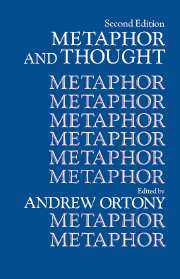Book contents
1 - Metaphor, language, and thought
Published online by Cambridge University Press: 05 June 2012
Summary
A central presupposition of our culture is that the description and explanation of physical reality is a respectable and worthwhile enterprise – an enterprise that we call “science.” Science is supposed to be characterized by precision and the absence of ambiguity, and the language of science is assumed to be correspondingly precise and unambiguous – in short, literal. For this reason, literal language has often been thought the most appropriate tool for the objective characterization of reality. For example, in early twentieth-century Western philosophy a tacit belief in the privileged status of literal language was an important underlying assumption of picture theories of meaning (e.g., Russell, 1956; Wittgenstein, 1921/1961). This belief reached a peak in the doctrine of logical positivism, so pervasive amongst philosophers and scientists sixty years ago. A basic notion of positivism was that reality could be precisely described through the medium of language in a manner that was clear, unambiguous, and, in principle, testable – reality could, and should, be literally describable. Other uses of language were meaningless for they violated this empiricist criterion of meaning. During the heyday of logical positivism, literal language reigned supreme.
A different approach is possible, however, an approach in which any truly veridical epistemological access to reality is denied. The central idea of this approach is that cognition is the result of mental construction. Knowledge of reality, whether occasioned by perception, language, or memory, necessitates going beyond the information given.
- Type
- Chapter
- Information
- Metaphor and Thought , pp. 1 - 16Publisher: Cambridge University PressPrint publication year: 1993
- 50
- Cited by



